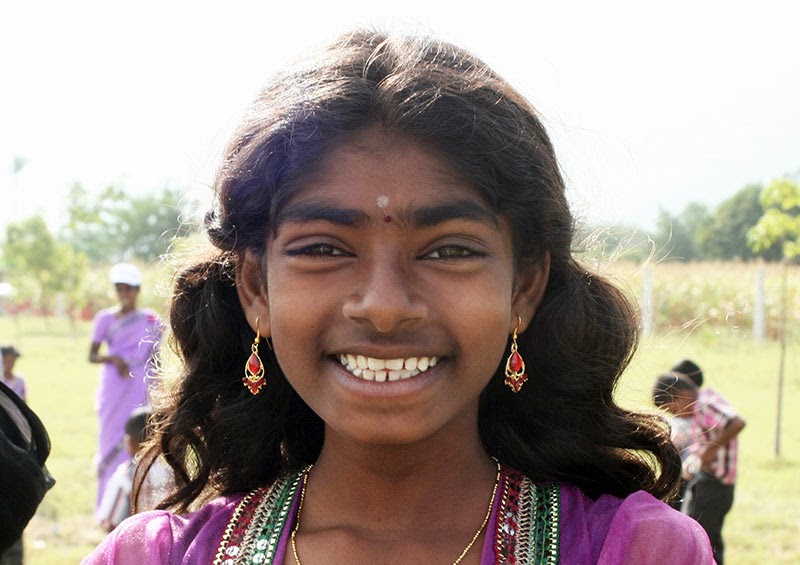By Erna Solberg and Hannah Godefa, Special to CNN
Editor’s note: Erna Solberg is prime minister of Norway and co-chair of the U.N. Secretary General’s Millennium Development Goals Advocates. Hannah Godefa is UNICEF National Ambassador for Ethiopia. The views expressed are their own. This is the latest in a series of articles ahead of a special GPS show from Davos this Sunday.
As the humanitarian crises in South Sudan and Syria and Central African
Republic continue to unfold, girls are once again caught in the cross-fire.
Murdered by soldiers, killed or sexually assaulted as they flee, their lives
are being ravaged by wars they did not start. Once again, they are the victims
of somebody else’s dispute, subjected to sexual violence by those hoping to
achieve their military and political goals.
How much more are we willing to stand?
Currently 28.5 million children in conflict-affected countries are out
of school, more than half of them are girls. It is not just their security, but
their education and hope for a better life that are being ruined.
But these girls don’t need to be faceless, voiceless statistics. They
can be victors, like Malala, who captivated us when she bravely stood up for
her right to education, changing the way we think about young girls and their
rights.
The key is investing in girls’ potential, something that can be a
win-win for everyone – enabling female participation in local economies can
accelerate the fight against poverty, inequity and gender disparity. When you
educate a girl, you educate a nation.
This is one of the key messages we, the prime minister of Norway and a 16-year-old UNICEF National Ambassador for Ethiopia, will deliver this week at the World Economic Forum in Davos as we encourage those gathered to “reshape the world” by putting young girls first. We will raise our voices to galvanize the crucial support needed to change attitudes and transform the lives of the countless Malalas, standing together to ensure that these girls are neither invisible nor forgotten.
This is one of the key messages we, the prime minister of Norway and a 16-year-old UNICEF National Ambassador for Ethiopia, will deliver this week at the World Economic Forum in Davos as we encourage those gathered to “reshape the world” by putting young girls first. We will raise our voices to galvanize the crucial support needed to change attitudes and transform the lives of the countless Malalas, standing together to ensure that these girls are neither invisible nor forgotten.
We are two very different women from different generations, cultures and
countries, but like millions of other women and men out there, we agree on
this: invest in girls. The question is, is anyone really listening to such
calls? After all, we’ve been talking about giving girls equal access to
education, employment and healthcare for the past three decades. Will the
international community – government, business and the general public – finally
take much needed action?
Educated girls and women have smaller families and healthier children,
are less likely to die in childbirth, are more likely to see their children
survive past the age of 5, are more likely to send their children to school,
and are better able to protect themselves and their children from malnutrition,
HIV/AIDS, trafficking, and sexual exploitation. Education empowers women,
multiplying their economic choices and contributions, and increasing their
political voice and influence across the board.
The numbers don’t lie. For every year a girl stays in school and learns,
her future earnings increase hugely. An extra year of primary school education,
for example, boosts girls’ eventual wages by 10 to 20 percent. A one percentage
point increase in female secondary education raises the average level of GDP by
0.3 percentage points. Does anyone need more convincing?
In today’s hyper-networked world, we are witnessing unprecedented shifts in traditional power dynamics, and we will all end up impoverished if we remain complicit to girls being denied their right to a better future. Denying girls their rights – whether it be for social, cultural, or economic reasons – means that half the world’s population is prevented from fully contributing to its own economic growth and well-being and to that of local communities.
In today’s hyper-networked world, we are witnessing unprecedented shifts in traditional power dynamics, and we will all end up impoverished if we remain complicit to girls being denied their right to a better future. Denying girls their rights – whether it be for social, cultural, or economic reasons – means that half the world’s population is prevented from fully contributing to its own economic growth and well-being and to that of local communities.
The voices calling for action are not just ours, but have been heard
echoing around the world in the United Nations’ MY World survey on people’s
development priorities, as well as in the action agenda laid out in the Girl
Declaration. When girls and women across the developing world have been asked
what they want for their future, the resounding answer is: education, jobs,
healthcare and security.
The Millennium Development Goals (MDGs) have been critical in
galvanizing progress around gender equality and women’s empowerment, but we
must build on this success. The clock is ticking: with close to 700 days to go
until the MDGs deadline, the targets we set ourselves won’t be reached unless
greater investment in girls’ empowerment is made. Without this, girls will
continue to drop out of school for lack of safe and supportive learning
environments. Women will still marry young, and will still die in childbirth
each day for want of simple medical interventions.
As the old adage goes, you can teach a man to fish to feed himself for a
lifetime. But if you invest in a girl, she feeds herself, educates future
children, lifts up her community and propels her nation forward – charting a
path that offers dignity for all in the process.








0 comments:
Post a Comment